Ever Wish You Could Harness the Power of Nature for Your Health?

Are you tired of reaching for over-the-counter pills every time you feel under the weather? Do you yearn for a gentler, more holistic approach to health and wellness? If so, it’s time to unlock the secrets of herbal remedies – nature’s own medicine cabinet.
- Nature’s Healing Touch: A Timeless Tradition
- Why Choose Herbal Remedies?
- What Are Herbal Remedies? Unveiling Nature’s Medicine Cabinet
- Defining Herbal Remedies: More Than Just Tea
- Herbal Remedies vs. Supplements: Clearing the Confusion
- A Journey Through Time: The Rich History of Herbal Medicine
- Traditional Medicine Systems: A Holistic Approach to Healing
- How Do Herbal Remedies Work? Decoding Nature’s Healing Power
- Multiple Mechanisms of Action: A Holistic Approach
- Holistic Healing: Addressing the Root Cause
- Popular Herbal Remedies and Their Uses: Nature’s Pharmacy at Your Fingertips
- Immune Support: Boost Your Body’s Defenses Naturally
- Safety Considerations for Herbal Remedies: Navigating Nature’s Medicine Cabinet Wisely
- Dosage: Finding the Right Balance
- Quality Matters: Choosing Reputable Brands
- Embrace the Power of Plants: Your Journey to Natural Wellness Begins
Nature’s Healing Touch: A Timeless Tradition
Herbal remedies, also known as botanical medicine or phytotherapy, have been used for centuries to treat ailments and promote well-being. From ancient civilizations to modern-day practitioners, people have turned to plants for their healing properties.
What Exactly Are Herbal Remedies?

Herbal remedies are natural products derived from plants, including their leaves, flowers, stems, roots, and seeds. These plants contain a wide array of active ingredients, like flavonoids, alkaloids, and essential oils, that can interact with your body to promote healing and balance.
Why Choose Herbal Remedies?
Herbal remedies offer a more natural and holistic approach to health, often addressing the root cause of an issue rather than just masking the symptoms. They can be used for a wide range of conditions, from everyday ailments like colds and headaches to chronic conditions like anxiety and inflammation.
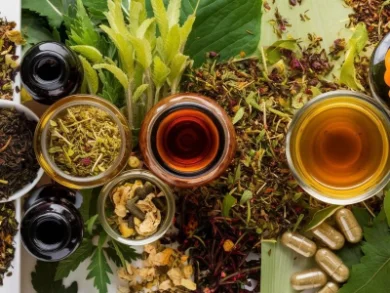
What You’ll Discover in This Guide
In this beginner’s guide, we’ll demystify the world of herbal remedies and empower you to make informed decisions about your health. You’ll learn:
- The fascinating history of herbal medicine, from ancient traditions to modern practices.
- How herbal remedies work their magic on your body, interacting with your systems to promote healing.
- Popular herbal remedies for common ailments and how to use them safely and effectively.
- Important safety considerations to keep in mind when exploring herbal remedies.
Are You Ready to Embrace Nature’s Pharmacy?
Join us as we delve into the world of herbal remedies, uncovering their potential to support your health and well-being in a natural and holistic way. It’s time to discover the power of plants and embark on a journey towards a healthier, more vibrant you!
What Are Herbal Remedies? Unveiling Nature’s Medicine Cabinet
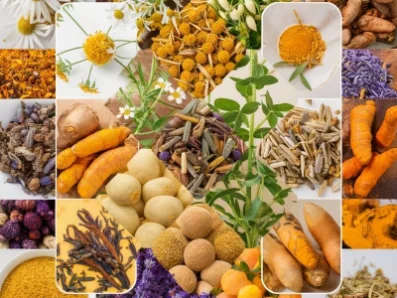
Let’s kick off our exploration of herbal remedies by defining what they are and how they’ve been used throughout history. At their core, herbal remedies are nature’s gift to us – plants or plant-derived substances that have been used for centuries to promote health and well-being.
Defining Herbal Remedies: More Than Just Tea
When you hear “herbal remedies,” you might picture a soothing cup of chamomile tea. And while herbal teas are definitely a popular form, there’s so much more to discover!
Herbal remedies come in a variety of forms, each with its unique advantages:
- Teas: Infusions made by steeping herbs in hot water.
- Tinctures: Concentrated liquid extracts made by soaking herbs in alcohol or vinegar.
- Capsules: Dried herbs ground into powder and encapsulated for convenience.
- Essential Oils: Highly concentrated aromatic oils extracted from plants, used for aromatherapy or topical application.
- Salves: Topical ointments made with herbs and oils for soothing skin ailments.
- Poultices: Warm, moist compresses made with herbs to relieve pain and inflammation.
The beauty of herbal remedies lies in their versatility and accessibility. You can sip them as tea, apply them topically, or even incorporate them into your cooking!
Active Ingredients: Nature’s Pharmacy
So, what makes herbal remedies so special? It’s all about the active ingredients – the powerful compounds within plants that interact with your body to promote healing and balance. These compounds, such as flavonoids, alkaloids, and essential oils, have a wide range of therapeutic properties.

For example, flavonoids found in chamomile have calming and anti-inflammatory effects, while alkaloids in turmeric possess potent antioxidant and pain-relieving properties. Each herb boasts a unique combination of active ingredients, making them valuable allies in your quest for health and wellness.
Herbal Remedies vs. Supplements: Clearing the Confusion
Now, you might be wondering, “Aren’t herbal remedies just supplements?” While there’s some overlap, there are also key differences. Herbal remedies are natural products derived directly from plants, while supplements can include synthetic ingredients or isolated plant compounds.
Think of herbal remedies as the whole package – using the entire plant with all its complex and synergistic constituents. Supplements, on the other hand, often isolate specific compounds, which may not always provide the same benefits as using the whole herb.
It’s important to note that not all supplements are created equal. Some may contain fillers, binders, or other additives that can dilute their effectiveness or even cause adverse reactions. When choosing herbal supplements, opt for reputable brands that prioritize quality and transparency.
By understanding the unique characteristics of herbal remedies, you’ll be better equipped to make informed decisions about incorporating them into your wellness routine.
A Journey Through Time: The Rich History of Herbal Medicine
Herbal remedies aren’t a new-age fad; they’re steeped in a rich history that spans across continents and cultures. For millennia, humans have turned to nature’s pharmacy for healing and wellness. Let’s take a captivating journey through time to explore the ancient roots of herbal medicine and its enduring impact on modern practices.

Ancient Roots: Healing Wisdom of the Past
Long before modern medicine existed, our ancestors relied on the healing power of plants. Ancient Egyptians documented their extensive knowledge of herbal remedies on papyrus scrolls, using plants like aloe vera, garlic, and coriander for various ailments.

In ancient China, herbal medicine was a cornerstone of healthcare. Traditional Chinese Medicine (TCM) developed sophisticated systems for diagnosing and treating diseases using a vast array of herbs, many of which are still used today.
Across the globe, indigenous cultures have also relied on herbal remedies for generations, passing down their knowledge through oral traditions and rituals. Native American tribes, for example, used herbs like echinacea, goldenseal, and yarrow for their immune-boosting and wound-healing properties.
Traditional Medicine Systems: A Holistic Approach to Healing
Herbal medicine isn’t just about individual plants; it’s about understanding the interconnectedness of the human body and the natural world. Traditional medicine systems like Ayurveda (India), Traditional Chinese Medicine (TCM), and Unani (Greece) take a holistic approach to health, emphasizing balance and harmony within the body and its environment.

These systems view the body as a complex network of energy channels and vital forces, with herbs acting as catalysts to restore balance and promote healing. They often incorporate dietary changes, lifestyle modifications, and spiritual practices alongside herbal remedies for a comprehensive approach to wellness.
Modern Herbalism: A Resurgence of Interest
While modern medicine has made incredible advancements, there’s been a growing interest in natural and holistic approaches to health in recent decades. People are increasingly turning to herbal remedies as a complement or alternative to conventional treatments.
This resurgence is driven by several factors, including:
- Growing Awareness of Side Effects: Concerns about the potential side effects of pharmaceutical drugs have led many to explore gentler, plant-based alternatives.
- Desire for Personalized Medicine: Herbal remedies can be tailored to individual needs and constitutions, offering a more personalized approach to health.
- Focus on Prevention: Herbal medicine emphasizes preventive care and lifestyle changes to maintain health, rather than just treating symptoms.
The integration of traditional knowledge with modern scientific research has led to a deeper understanding of how herbal remedies work and their potential benefits. This has paved the way for a more evidence-based approach to herbal medicine, bridging the gap between ancient wisdom and modern science.
How Do Herbal Remedies Work? Decoding Nature’s Healing Power
Now that we’ve explored the rich history of herbal medicine, let’s delve into the fascinating science behind how these natural remedies actually work. Understanding their mechanisms of action can help you appreciate their potential benefits and make informed decisions about incorporating them into your wellness routine.
Phytochemicals: The Powerhouses of Herbal Remedies
![An illustration showcasing the diverse phytochemicals found in various herbs]](http://healthheatcare.com/wp-content/uploads/2024/07/An-illustration-showcasing-the-diverse-phytochemicals-found-in-various-herbs.webp)
Herbal remedies are brimming with bioactive compounds called phytochemicals, which are responsible for their therapeutic effects. These compounds interact with your body’s systems in various ways, promoting healing, balance, and overall well-being.
Some of the most common phytochemicals found in herbs include:
- Flavonoids: Powerful antioxidants that protect your cells from damage and may have anti-inflammatory and anti-cancer properties.
- Alkaloids: Nitrogen-containing compounds that can have diverse effects, ranging from pain relief to stimulating the nervous system.
- Essential oils: Aromatic compounds that give herbs their unique scents and flavors. They often possess antimicrobial, anti-inflammatory, and stress-relieving properties.
These phytochemicals work together synergistically, meaning the combined effect is often greater than the sum of its parts. This is one of the reasons why whole herbs are often preferred over isolated compounds in herbal remedies.
Multiple Mechanisms of Action: A Holistic Approach
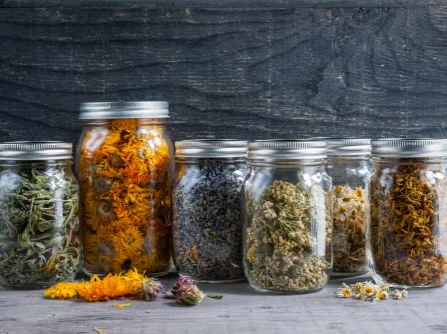
Unlike conventional drugs, which typically target a single pathway in the body, herbal remedies often work through multiple mechanisms of action. This makes them particularly effective for addressing complex health conditions that may involve multiple systems and processes.
For example, ginger, a popular herb used for digestion, works through several mechanisms:
- Anti-inflammatory: Ginger contains compounds like gingerol, which have potent anti-inflammatory effects, helping to reduce inflammation in the gut and relieve digestive discomfort.
- Antiemetic: Ginger has been shown to be effective in reducing nausea and vomiting, making it a popular remedy for morning sickness and motion sickness.
- Prokinetic: Ginger can stimulate the muscles in your digestive tract, helping to move food along more efficiently and preventing constipation.
Holistic Healing: Addressing the Root Cause
Herbal remedies often take a holistic approach to healing, aiming to address the underlying cause of an ailment rather than just masking the symptoms. This approach focuses on restoring balance within the body’s systems and promoting overall well-being.

For example, instead of simply suppressing a headache with painkillers, a herbalist might recommend herbs like feverfew or butterbur, which may help address the underlying causes of the headache, such as inflammation or tension.
By considering the individual’s unique constitution, lifestyle, and environment, herbal medicine strives to create a personalized treatment plan that addresses the whole person, not just their symptoms.
The Science Behind It All
While herbal medicine has a long history of traditional use, modern science is increasingly validating its efficacy. Numerous studies have demonstrated the therapeutic benefits of various herbs for a wide range of conditions, including anxiety, depression, pain, inflammation, and even certain types of cancer.

This growing body of evidence is helping to bridge the gap between traditional wisdom and modern science, paving the way for a more integrated and comprehensive approach to healthcare that harnesses the power of both nature and science.
Popular Herbal Remedies and Their Uses: Nature’s Pharmacy at Your Fingertips
Ready to dive into the treasure trove of herbal remedies? Nature’s medicine cabinet is stocked with a wide array of herbs, each boasting unique properties to address various health concerns. In this section, we’ll explore some of the most popular herbal remedies and their traditional uses, providing a glimpse into the healing power of plants.

Stress and Anxiety: Find Your Zen with Herbal Allies
Stress and anxiety are all too common in our fast-paced modern lives. Thankfully, nature provides us with a bounty of herbs that can help soothe our frayed nerves and restore inner peace.
- Ashwagandha: This adaptogenic herb has been used for centuries in Ayurvedic medicine to promote relaxation, reduce stress hormones, and improve overall well-being.
- Chamomile: This gentle herb is renowned for its calming properties. A cup of chamomile tea before bed can help you unwind and prepare for a restful sleep.
- Lavender: Known for its soothing aroma, lavender can be used in aromatherapy, teas, or baths to alleviate anxiety and promote relaxation.
- Lemon balm: This lemony herb has a mild sedative effect and can help ease anxiety and promote restful sleep.
- Valerian root: This potent herb has been used traditionally for insomnia and anxiety. It’s best taken at night to promote relaxation and sleep.

Sleep: Embrace the Sweet Slumber of Nature
If counting sheep isn’t cutting it, turn to these sleep-promoting herbs for a more natural approach to catching those Zzzs:
- Chamomile: As mentioned above, chamomile is a gentle and effective sleep aid that can help calm the mind and body.
- Lavender: In addition to its calming properties, lavender has been shown to improve sleep quality and duration.
- Passionflower: This beautiful flower has a long history of use as a sleep aid and can help reduce anxiety and restlessness.
- Valerian root: Known for its sedative effects, valerian root can help you fall asleep faster and stay asleep longer.

Digestion: Soothe Your Tummy with Herbal Remedies
From bloating and gas to indigestion and nausea, digestive issues can be a real pain (literally!). Luckily, many herbs offer relief for common digestive complaints:
- Ginger: This warming spice is a digestive powerhouse, known for its ability to relieve nausea, reduce inflammation, and stimulate digestion.
- Peppermint: Peppermint oil has been shown to be effective in easing symptoms of irritable bowel syndrome (IBS), such as abdominal pain and bloating.
- Fennel: This licorice-flavored herb can help soothe indigestion, reduce gas, and promote healthy digestion.
- Dandelion root: This often-overlooked weed is a natural diuretic and liver tonic, helping to detoxify the body and improve digestion.

Immune Support: Boost Your Body’s Defenses Naturally
Give your immune system a helping hand with these potent herbs:
- Echinacea: This popular herb is often taken at the first sign of a cold or flu to help boost the immune system and reduce the duration of illness.
- Elderberry: This antioxidant-rich berry has been shown to be effective in fighting off viral infections, particularly the flu.
- Garlic: This pungent herb contains allicin, a compound with antimicrobial and immune-boosting properties.
- Astragalus: This adaptogenic herb is used in Traditional Chinese Medicine to strengthen the immune system and promote overall vitality.
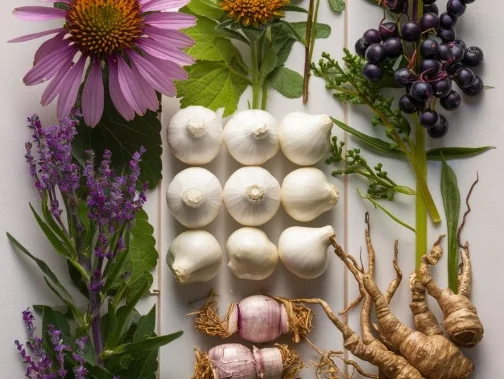
Pain Relief: Nature’s Anti-Inflammatory Arsenal
If you’re looking for natural ways to manage pain, several herbs offer anti-inflammatory and analgesic properties:
- Turmeric: This golden spice contains curcumin, a powerful anti-inflammatory compound that has been shown to be effective in reducing pain and inflammation associated with conditions like arthritis and osteoarthritis.
- Ginger: In addition to its digestive benefits, ginger also possesses anti-inflammatory properties that can help relieve pain and muscle soreness.
- Devil’s claw: This herb has been traditionally used to relieve joint pain and back pain.
- Willow bark: This is a natural source of salicin, a compound similar to aspirin that can help relieve pain and reduce inflammation.
![A close-up photo of a turmeric root, a piece of ginger, and a willow bark capsule]](http://healthheatcare.com/wp-content/uploads/2024/07/A-close-up-photo-of-a-turmeric-root-a-piece-of-ginger-and-a-willow-bark-capsule.webp)
Remember, while herbal remedies can be a valuable addition to your health and wellness routine, it’s always essential to consult with a qualified healthcare professional before using them, especially if you’re pregnant, breastfeeding, or taking medications.
While herbal remedies offer a natural approach to health, it’s crucial to use them wisely and prioritize safety. Remember, just because something is natural doesn’t automatically mean it’s safe for everyone or in every situation. Let’s explore some essential precautions to ensure you’re using herbal remedies responsibly and reaping their benefits without unwanted side effects.

Consult a Healthcare Professional: Your Trusted Guide
Before incorporating any new herbal remedy into your routine, it’s always wise to consult with your doctor, a qualified herbalist, or a naturopathic doctor. They can help you determine if a particular herb is right for you, considering your individual health conditions, medications, and any potential interactions.
This is especially important if you’re pregnant, breastfeeding, or have a chronic illness. Herbal remedies can be potent and may interact with medications or exacerbate certain health conditions. A healthcare professional can provide personalized guidance and ensure your safety.
Dosage: Finding the Right Balance
Just like with conventional medications, the dosage of herbal remedies matters. Taking too little may not be effective, while taking too much can lead to unwanted side effects.
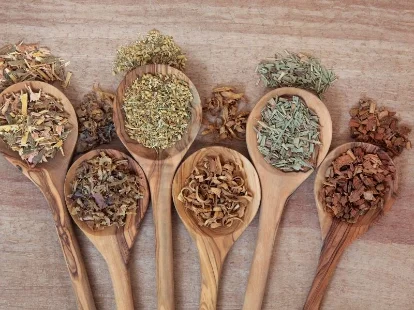
The appropriate dosage can vary depending on the specific herb, the form it’s in (tea, tincture, capsule, etc.), and your individual needs. It’s essential to follow the recommended dosage on the product label or consult with a healthcare professional for personalized guidance.
Quality Matters: Choosing Reputable Brands
Not all herbal products are created equal. Some may be contaminated with pesticides, heavy metals, or other harmful substances. Others may not contain the amount of active ingredients they claim.

To ensure the safety and effectiveness of your herbal remedies, choose high-quality products from reputable brands. Look for certifications from organizations like the National Sanitation Foundation (NSF) or the U.S. Pharmacopeia (USP), which verify the quality and purity of supplements.
Interactions: A Balancing Act
Herbal remedies can interact with prescription medications, over-the-counter drugs, and even other supplements. These interactions can reduce the effectiveness of your medications or lead to unwanted side effects.

Always inform your healthcare provider about any herbal remedies or supplements you’re taking, even if they seem harmless. They can assess potential interactions and help you make informed decisions about your health.
By following these safety considerations, you can confidently explore the world of herbal remedies and harness their natural healing power. Remember, it’s always better to err on the side of caution and prioritize your safety when it comes to your health and well-being.
Embrace the Power of Plants: Your Journey to Natural Wellness Begins

As we’ve journeyed through the fascinating world of herbal remedies, you’ve discovered their rich history, diverse forms, and powerful mechanisms of action. From soothing stress and promoting sleep to supporting digestion and boosting immunity, these natural allies offer a wealth of potential benefits for your health and well-being.
But remember, the world of herbal remedies is vast and nuanced. It’s crucial to approach it with knowledge, respect, and caution. Always consult with a qualified healthcare professional before starting any new herbal regimen, especially if you’re pregnant, breastfeeding, or taking medications. Prioritize quality and choose reputable brands to ensure safety and effectiveness.

With the right guidance and a discerning eye, herbal remedies can be a valuable addition to your wellness toolkit, complementing your lifestyle and empowering you to take charge of your health.
Your Next Steps on the Path to Natural Healing
- Educate Yourself: Continue researching different herbs and their uses. There’s a wealth of information available online, in books, and through reputable herbalists.
- Start Small: Begin by incorporating one or two herbs into your routine and observe how your body responds.
- Listen to Your Body: Pay attention to how you feel after taking herbal remedies. If you experience any adverse reactions, discontinue use and consult with your healthcare provider.
- Embrace the Journey: The path to natural wellness is a continuous exploration and learning process. Enjoy the journey of discovering the healing power of plants and the positive impact they can have on your life.
By embracing herbal remedies responsibly and incorporating them into a holistic approach to health, you can unlock a world of natural healing and vibrant well-being.




